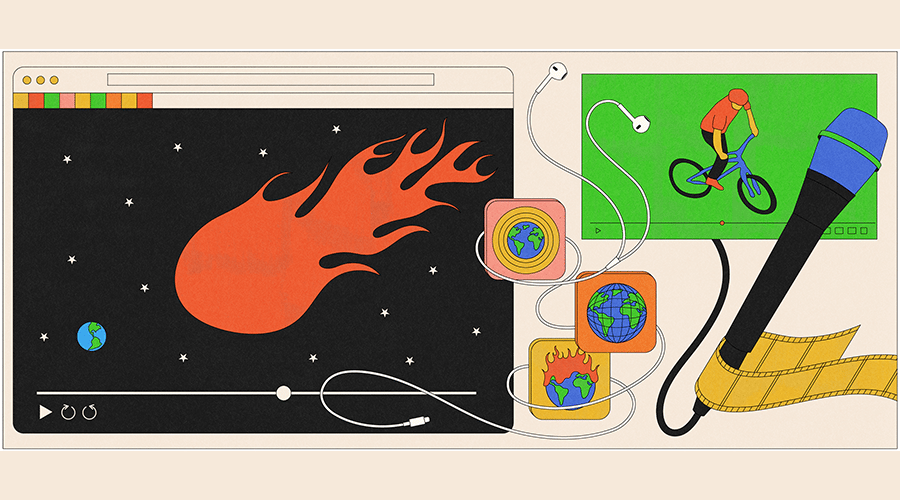If you watched the recent Netflix release Don’t Look Up, it probably got you thinking about climate change and how we’ve been relating to it—and that’s the point. The movie is the latest example of cultural strategy at work for positive social change.
What’s cultural strategy, you ask? Here’s one definition: “Cultural strategy is a field of practice that centers artists, storytellers, media makers and cultural influencers as agents of social change.”
This idea is why organizations like the Natural Resources Defense Council are turning to Hollywood to bring real storytelling into the issue of climate change beyond apocalyptic scenarios. NRDC is doing this, its Director of Content Partnerships told Variety, because Hollywood “has tremendous power to change culture norms.” The goal: To make climate not just a plot point but a part of the conversation in daily life.
Looking up
It’s not just Hollywood, though. This awakening has been playing out in many aspects of culture in recent years. Songs like “Feels Like Summer” by Childish Gambino and several others refer to the current crisis. Climate activist Greta Thunberg has become an inspiration and a provocateur to many, sparking conversations on social media. And Pope Francis in 2015 dedicated the first encyclical to the environment.
But not everything in the push for climate awareness has to be hyperconscious and gloomy. Humor and casual conversations can be incredibly effective communication tools. Witness the hilarious “Electric for All” campaign from the nonprofit group Veloz that features Arnold Schwarzenegger going undercover as a gasoline-loving car salesman, his pitch going over like a lead balloon with unsuspecting customers. A video on YouTube with nearly a million views illustrates the scale of renewable energy with a series of bike stunts on wind turbines. Content like this can be our best shot at action, because the more people talk about climate change (and talk about it in a helpful way) the better chance we have to inspire action.
Comedians are getting in on this, too: Check out our own Comedians Conquering Climate Change podcast and look out for comedy events from groups like the Dogwood Alliance — There’s Nothing Funny About Climate Change Comedy Tour — and Inside the Greenhouse.
Already, the number of people who deny or doubt the fact of climate change in Yale University surveys continues to go down, while a growing number of us are feeling alarmed. And online, people are seeing and talking about climate-related issues significantly more in recent years. Last fall’s COP26 conference saw 20 times more coverage than the previous summit, according to media monitoring platform NewsWhip. In 2019, NewsWhip has also noted, more articles were written about climate-related issues than any other year, and engagement with those articles on social media dwarfed previous years.
These are signs of shifting norms, and cultural strategy can help accelerate this shift. It’s happened before. Dozens of events over the past few decades, from Ellen DeGeneres coming out and having her own wildly popular talk show to Macklemore’s hit “Same Love” have resulted in strides for marriage equality, as noted in the cultural strategy guide Making Waves. Public opinion favoring legal gay marriage went from 27% in 1996 to 53% in 2013, when the Defense of Marriage Act was struck down.
Another example: Logic’s song about suicidal thoughts, “1-800-273-8255,” released in 2017, may have saved hundreds of lives, according to a study released in 2021. How? More people called the number in the song’s title, which is the US National Suicide Prevention Lifeline.
Amplify the shift
We need a shift to transform mounting cultural awareness about the climate crisis into solutions. And we still need to work on the awareness part, especially in schools: Research shows climate change education in many middle schools and high schools is severely lacking.
“We as a society can only fully address climate change when it is reflected in our deepest values about who we are and how we should live,” writes Andrew Hoffman, a professor of sustainable enterprise at Michigan University.
All of us have the opportunity to reevaluate what we value most and seek new ways to align with that—not just with words but actions. We can make changes at home, certainly, to quit fossil fuels and reduce waste. We can also support a clean energy transition driven by people power. We can be clean energy voters who also ask for change from our leaders, business, and schools.
On our own, we can also share lighthearted and thought-provoking cultural moments that reflect both awareness and hope, whether it’s a funny video, an interesting podcast, or some striking “activism.” We at Generation180 lean on storytelling with long-form illustrations, videos, and cartoons to make energy issues more accessible. Many examples of cultural strategy have an important side benefit: They transcend barriers like language and economic status.
“Imagine if, instead of PDFs and newspaper-long reads, we shared the latest science through comic books, short stories, or virtual games,” writes climate justice activist Mitzi Jonelle Tan. “Making climate activism accessible is about making sure that everyone can understand it.”















